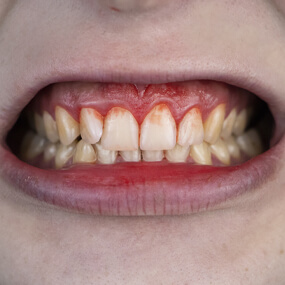Is Xylitol Good for Your Dental Health?

Xylitol is not a new discovery. In fact, it was discovered by Emil Fischer, a German chemist, in 1891—well over a century ago. However, it was not until the 1960s that this plant-derived sugar substitute became used as an artificial sweetener. During this same period, dental researchers began to study the effect that this natural sugar alcohol had on human health. Fast forward to today to find that the oral health benefits are proven and that the FDA has approved the substance for widespread use in food.
What Is Xylitol?
Xylitol is a natural sugar found in corn, mushrooms, raspberries, and many other fruits and vegetables. It tastes like the sugar you associate with sweets, but it is chemically different. In fact, it has only 60 percent of the calories table sugar does, and that makes it a good option as an artificial sweetener. In addition, xylitol does not cause tooth decay as table sugar does. It also helps with oral health by inhibiting the formation of plaque and not disrupting remineralization of the teeth.
Oral Health Benefits
Streptococcus mutans—called S. mutans for short—is the primary bacteria associated with dental plaque. Plaque is the sticky substance that forms on teeth and other oral surfaces. Some plaque is normal, but a persistent accumulation can cause a host of oral health issues. These include tooth decay and gum disease, and gum inflammation has been linked to numerous systemic health issues.
Dating as far back as the 1960s, research has shown that xylitol inhibits the growth of S. mutans, and that research has become clearer and more robust over time. Scientists have found that when xylitol is used over an ongoing period, the microbiome of the mouth changes, and there are fewer bacteria surviving on the surfaces of the teeth. The result is less buildup of plaque and thus less acid attacking the teeth. Less plaque along the gumline also means less likelihood of a gum infection.
It is for this reason that many dentists and other dental professionals recommend sugar-free gum with xylitol. The brand is not important as long as the gum has xylitol and does not have sugar. The benefits of such chewing gum are multidimensional. Saliva serves an important role in how your mouth combats tooth decay and gum disease. Saliva washes away food particles, reduces pH levels in the mouth, distributes trace minerals to remineralize the teeth, and suppresses odor-causing aspects of bacteria. Not only does simply chewing gum promote saliva production but the xylitol itself stimulates it. Keeping the mouth moist is an important aspect of maintaining good oral health, and sugar-free gum with xylitol is a good option after meals and snacks and, in particular, when you cannot brush and floss.
Here are some oral health benefits of xylitol that have been clinically documented:
- A number of studies have focused on the effects of xylitol on Porphyromonas gingivalis, which is the bacteria associated with periodontal disease. P. gingivalis can lead to gum inflammation as well as inflammation elsewhere in the body if it reaches the bloodstream. What has been found is that the xylitol inhibits the growth of the bacteria as well as increases the production of immune system proteins. Therefore, xylitol may be beneficial not just to oral health but systemic health.
- Clinical studies of humans show that replacing sugar with xylitol in a diet reduces cavities by at least 30 percent and by as much as 85 percent.
- One notable study revealed that while the levels of beneficial bacteria remained the same, levels of S. mutans and other bad bacteria fell by as much as 75 percent and by at least 27 percent.
- Studies involving animals have revealed that xylitol aids in calcium absorption. More efficient absorption not only strengthens the teeth but helps stave off osteoporosis.
- Regular use of xylitol by mothers reduces transmission of S. mutans to their children during pregnancy and during the first two years of life by as much as 80 percent.
- Chewing gum, in general, helps to avoid ear infections because all the chewing and swallowing helps to remove earwax as well as clear the middle ear. Sugar-free gum with xylitol is particularly effective because it inhibits the growth of bacteria that gets into the eustachian tubes. This tube controls the pressure in the middle ear and connects the middle ear to the nose.
- Among children afflicted with recurring middle ear infections, one study showed that daily use of a sugar-free xylitol gum reduced the infection rate by 40 percent.
- Xylitol nasal sprays are effective at reducing asthma, allergy, and sinus infection incidents.
- Studies have shown eating xylitol instead of sugar can lower the risk of premenstrual syndrome, endometriosis, fibroids, ovarian cysts, and polycystic ovarian syndrome, which interferes with the ovarian cycle. There is also some evidence that it may lower the risk of breast cancer as well.
- Xylitol inhibits the growth of Candida, which is a naturally occurring fungus in the human body that can lead to infections at high levels. In regard to oral health, it is most commonly associated with thrush.
- Research has revealed that xylitol is a food source for the healthy bacteria in your gut. It may be able to increase the effectiveness of probiotics and thus improve digestive health.
- Xylitol increases the activity of white blood cells, which fight bacteria. This means that xylitol could boost the immune system and even help to ward against degenerative diseases.
Xylitol and Its Glycemic Index
Being lower in calories is not the only advantage xylitol has over table sugar. It also has a very low glycemic index. Table sugar and high fructose corn syrup, on the other hand, have a very high GI. That causes blood sugar levels to spike and insulin levels to spike in response. Consumed in excess, high fructose corn syrup can lead to insulin resistance as well as other metabolic issues. Xylitol contains no fructose, and its effects on blood sugar and insulin in humans is negligible.
Try Products That Contain Xylitol
Xylitol is most often associated with sugar-free gum because the gum tastes great, helps to promote saliva production, and can help to inhibit plaque buildup. But the FDA has approved xylitol for use in many other foods, and usage is becoming more prevalent. Note that xylitol in foods may not have the same oral health benefits as xylitol in gum. When oral health is the focus, the general rule is to ensure that xylitol is listed as the first ingredient. In addition, any xylitol gum should be chewed for at least five minutes, and mints should be allowed to dissolve completely in order to get the best effect.
In addition to gum and mints, common xylitol products include:
- Toothpaste
- Oral rinses
- Oral wipes
- Pacifiers
- Dry mouth spray
Xylitol Is Safe for Humans but Not Dogs and Cats
Xylitol is becoming more prevalent in human diets as well as health and beauty products because it causes no adverse reactions in people. The same is not true for dogs, cats, and other pets. If your pet ingests xylitol, the body will detect it as glucose. It will create insulin as a response, which can lead to a condition called hypoglycemia—low blood sugar. It can also interfere with liver function, and high doses can lead to outright liver failure. Early indications that a pet has ingested xylitol include lethargy, vomiting, and loss of coordination. If you suspect that your pet has ingested xylitol, you should take the pet to a veterinarian immediately. A fast response can make all the difference in these cases.
Xylitol in Combination With Good Oral Hygiene
The science is clear: xylitol can inhibit plaque formation and thus significantly reduce the likelihood of cavities. However, xylitol is not a total solution. It is only effective within the context of a clean mouth. If oral hygiene is poor, it will not matter how much sugar-free xylitol gum a person chews.
To keep your mouth healthy and clean, brush twice a day, and floss your teeth and scrape your tongue whenever you brush. When you brush, brush for two to three minutes with a soft-bristled brush and fluoride toothpaste. Consider balancing your diet with your oral health in mind. Avoid tobacco and limit alcohol intake, and see your dentist every six months to get a clean bill of health.
Chew a Sugar-Free Gum With Xylitol
Jeffrey D. Clark, DDS, is a leading dentist in Scottsdale who often recommends sugar-free gum with xylitol as a great way to freshen the breath and promote saliva production after meals and snacks. Of course, chewing gum is no substitute for regular brushing, flossing, and dental visits. At Scottsdale Cosmetic Dentistry Excellence, you can have your teeth cleaned by a skilled oral hygienist and have a comprehensive exam performed by Dr. Clark. Call us today at 480 585 1853 to schedule your appointment.




